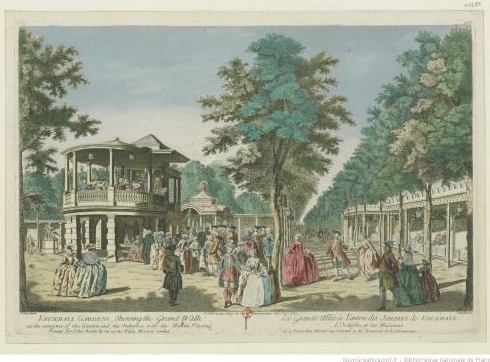Our Research Exchange series features interviews with staff and researchers across The National Archives in which they discuss their new discoveries and their work’s potential for impact. The purpose of the series is to highlight and demystify the research we do and open up new ideas and discussion.
DIGIT.EN.S
In this edition of Research Exchange, Mathilde Guillo, our colleague from the University of Brest who completed a secondment at The National Archives for the DIGITENS project, talks about the project, the digital encyclopedia and how it can benefit researchers.
What is the DIGIT.EN.S project?
Initiatives in favour of open science that aim to make scientific research accessible to a general public are increasingly encouraged by civil society, public institutions and research funding bodies. Meanwhile, technological innovation has allowed increasing access to knowledge.
The DIGIT.EN.S digital encyclopedia, the first open-access encyclopedia of British and European sociability in the long 18th century (1650 to 1850), is an example of such an initiative.
Launched in 2021, the digital encyclopedia is the outcome of a scientific project on British and European sociability initially led by researchers from the Université de Bretagne Occidentale (University of Western Brittany, France) and the Université Sorbonne Paris Nord) in 2009 who then formalized their expanding research network with the creation of the GIS Sociability in 2017. It is now an international interdisciplinary and intersectoral research group that gathers experts on 18th-century sociability from 13 institutions. Their flagship project – the EU-funded DIGIT.EN.S project – aims at developing an open-access platform, a resource not only for scholars but also for students and any person interested in the history of European models of sociability. DIGIT.EN.S involves nine academic partners along with three non-academic partners: The National Archives in London, the Bibliothèque nationale de France (BnF) and the Musée Cognacq-Jay in Paris.

Since 2018, research on sociability led by the GIS Sociability has focused on the connections of British models of sociability with continental and colonial forms and practices. Indeed, the long 18th century saw the emergence of cross-cultural forms of sociability, as values and practices started to be disseminated through travels, correspondences, translations, dissemination of scientific knowledge and cosmopolitan places.
The entries of the DIGIT.EN.S encyclopedia examine how these forms circulated from one culture to another and how they were appropriated and modified. Researchers also investigate how, in times of war and conflict, sociable models were resisted, rejected, retranslated or re-codified and turned into acceptable national forms of sociability. The circulation and the perpetual transformation of models of sociability have become the key issues of this scientific project.
How was the project funded?
The project is funded by Horizon 2020-MSCA-RISE, a programme that offers funding for short-term staff exchanges between academic and non-academic institutions. In the case of DIGIT.EN.S, one-month secondments allow researchers to explore digitized collections but also unpublished and non-digitized resources, and to collaborate with curators. Beyond a better access to collections and archives, the project enables its members to develop their knowledge and skills, including in digital humanities, thanks the organisation of workshops. Seven PhD students are involved in the project. Numerous conferences, seminars and cycles of talks have been organised, thus strengthening knowledge-sharing and networking between institutions, researchers, curators and digital experts.
Can you talk about some of the research that has gone into the encyclopedia?
In the first three years of the project (2019 to 2022), 17 staff members from continental universities visited The National Archives so they could find resources to enrich their research related to 18th-century sociability. Their findings have been or will be published on DIGIT.EN.S. For instance, The National Archives’ collections have provided valuable resources for Dr Stéphane Jettot (Sorbonne Université, an historian and specialist in elite family history and genealogy) to publish entries on portable directories, which were key instruments of sociability in the 18th century, or on bookshops in London. Dr Sabrina Juillet-Garzon (Université Sorbonne Paris Nord, a lecturer in British civilisation and specialist of Scottish political and religious history) discovered the manuscripts (see footnote 1) of an Englishman describing the manners and traditions of the Highland clans to his friends. Prof. Alain Kerhervé (Université de Bretagne Occidentale, a specialist in 18th-century letter-writing) has worked lately on 18th-century commercial letters and epistolary manuals and Prof. Alexis Tadié (Sorbonne Université and a specialist of 18th-century literature and sporting practices) is currently researching archives related to the duelling practice in Britain in the long 18th century.
What collaborations have come out of this project?
Thanks to these staff exchanges, collaborative projects have also emerged between the BnF and The National Archives. Six researchers and curators from the Bibliothèque nationale de France and The National Archives have visited or will visit each other. In 2019, curators from The National Archives and BnF worked together to pool their respective collections of samples of wallpapers and make them available to the public on GallicaPix, an iconographic online database.
How is the database set up to be useful for researchers?
The concept of sociability is explored in DIGIT.EN.S through five categories of entries – people, places, objects, practices and concepts – so as to map the concept of sociability and the cross-cultural models that spread throughout Europe during the long 18th century. The entries contain illustrations, keywords, hyperlinks and further reading suggestions, and can be downloaded and printed. The digital format allows the encyclopedia to be a dynamic, updatable and easy-to-use resource. It is also supplemented with an anthology of primary sources which provides a valuable research tool for scholars, teachers and students interested in the cultural and social history of the long 18th century.
Find out more
- Access the encylopedia
- Discover how to contribute
- Get more information on the GIS Sociabilités and H2020 DIGIT.EN.S project
Footnotes:
- Highlanders: account describing their clan structure, weapons, dress and way of life, ref. SP 54/14/35, The National Archives